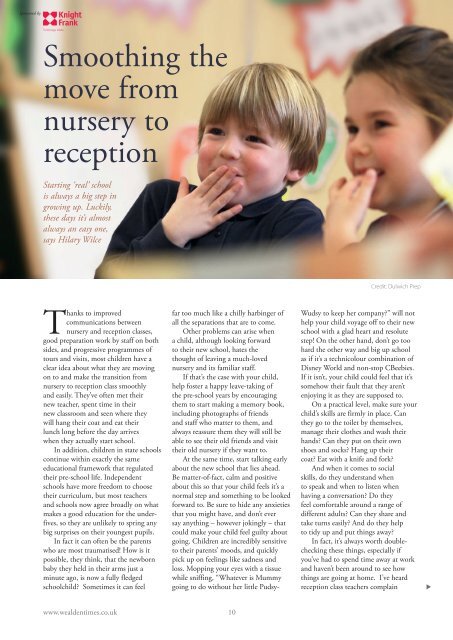Education | ED03 | Summer 2016
A Wealden Times Magazine
A Wealden Times Magazine
Create successful ePaper yourself
Turn your PDF publications into a flip-book with our unique Google optimized e-Paper software.
Sponsored by<br />
Tunbridge Wells<br />
Smoothing the<br />
move from<br />
nursery to<br />
reception<br />
Starting ‘real’ school<br />
is always a big step in<br />
growing up. Luckily,<br />
these days it’s almost<br />
always an easy one,<br />
says Hilary Wilce<br />
Credit: Dulwich Prep<br />
Thanks to improved<br />
communications between<br />
nursery and reception classes,<br />
good preparation work by staff on both<br />
sides, and progressive programmes of<br />
tours and visits, most children have a<br />
clear idea about what they are moving<br />
on to and make the transition from<br />
nursery to reception class smoothly<br />
and easily. They’ve often met their<br />
new teacher, spent time in their<br />
new classroom and seen where they<br />
will hang their coat and eat their<br />
lunch long before the day arrives<br />
when they actually start school.<br />
In addition, children in state schools<br />
continue within exactly the same<br />
educational framework that regulated<br />
their pre-school life. Independent<br />
schools have more freedom to choose<br />
their curriculum, but most teachers<br />
and schools now agree broadly on what<br />
makes a good education for the underfives,<br />
so they are unlikely to spring any<br />
big surprises on their youngest pupils.<br />
In fact it can often be the parents<br />
who are most traumatised! How is it<br />
possible, they think, that the newborn<br />
baby they held in their arms just a<br />
minute ago, is now a fully fledged<br />
schoolchild? Sometimes it can feel<br />
far too much like a chilly harbinger of<br />
all the separations that are to come.<br />
Other problems can arise when<br />
a child, although looking forward<br />
to their new school, hates the<br />
thought of leaving a much-loved<br />
nursery and its familiar staff.<br />
If that’s the case with your child,<br />
help foster a happy leave-taking of<br />
the pre-school years by encouraging<br />
them to start making a memory book,<br />
including photographs of friends<br />
and staff who matter to them, and<br />
always reassure them they will still be<br />
able to see their old friends and visit<br />
their old nursery if they want to.<br />
At the same time, start talking early<br />
about the new school that lies ahead.<br />
Be matter-of-fact, calm and positive<br />
about this so that your child feels it’s a<br />
normal step and something to be looked<br />
forward to. Be sure to hide any anxieties<br />
that you might have, and don’t ever<br />
say anything – however jokingly – that<br />
could make your child feel guilty about<br />
going. Children are incredibly sensitive<br />
to their parents’ moods, and quickly<br />
pick up on feelings like sadness and<br />
loss. Mopping your eyes with a tissue<br />
while sniffing, “Whatever is Mummy<br />
going to do without her little Pudsy-<br />
Wudsy to keep her company?” will not<br />
help your child voyage off to their new<br />
school with a glad heart and resolute<br />
step! On the other hand, don’t go too<br />
hard the other way and big up school<br />
as if it’s a technicolour combination of<br />
Disney World and non-stop CBeebies.<br />
If it isn’t, your child could feel that it’s<br />
somehow their fault that they aren’t<br />
enjoying it as they are supposed to.<br />
On a practical level, make sure your<br />
child’s skills are firmly in place. Can<br />
they go to the toilet by themselves,<br />
manage their clothes and wash their<br />
hands? Can they put on their own<br />
shoes and socks? Hang up their<br />
coat? Eat with a knife and fork?<br />
And when it comes to social<br />
skills, do they understand when<br />
to speak and when to listen when<br />
having a conversation? Do they<br />
feel comfortable around a range of<br />
different adults? Can they share and<br />
take turns easily? And do they help<br />
to tidy up and put things away?<br />
In fact, it’s always worth doublechecking<br />
these things, especially if<br />
you’ve had to spend time away at work<br />
and haven’t been around to see how<br />
things are going at home. I’ve heard<br />
reception class teachers complain<br />
<br />
www.wealdentimes.co.uk<br />
10


















